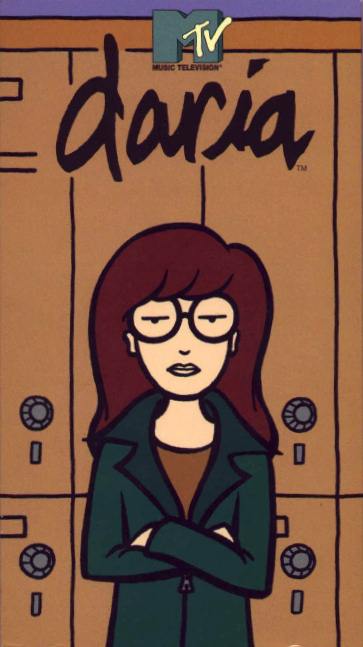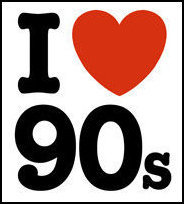Don't forget to enter Children of the 90s $60 CSN Store Gift Certificate Giveaway! You have until this Friday to qualify for the prize, so put your entry in today!
It's been quite the democratic week here at Children of the 90s. Admittedly it's only Tuesday, so we still have plenty of time to get all anarchical on you, but as of yet we've been riding the reader response train. You guys are just chock full of good ideas, so until you run out I'm going to milk your suggestions for all they're worth. Which, for the record, is quite a lot. So, you know. Thanks.
For those of us who grew up as voracious readers, this list is potentially endless. There were so many popular and influential books that shaped our childhood and reading habits. To answer your questions before the protests begin, we've already covered ad nauseum series including Sweet Valley High, The Babysitters' Club, Goosebumps, and Choose Your Own Adventure. Yes, they made up a major bulk of our leisure reading, but they are only the tip of the iceberg in terms of children's literary material. Feel free to peruse the backlogs, though--those series are all worth a reminiscence or two of their own.
Based on many of your suggestions, I've put together Part II of our popular book list below. Don't see your favorites on here? Don't worry. These extra-long posts have a way of getting sort of unwieldy, so in the spirit of streamlining and readability I've conveniently parceled this out over a series of posts. If you have other suggestions, drop them in the comments. And for those of you eagerly awaiting the Reader's Choice childhood movie awards, we'll leave the commenting open for a few more days to let the ideas soak a bit. Watch for that post, coming to a Children of the 90s near you very, very soon. Get pumped.
Our second installment of popular elementary school-age reading material form the 80s and 90s includes:
The Giver

Despite its frequent banning, The Giver remains a popular book for school-age children. The subject matter may be a bit heavy for young readers--a tightly controlled dystopian future society a la 1984--but its creepiness resonates well with imaginative kids. Sure, I used to semi-fantasize/semi-worry that my eye color had marked me as the bearer of the world's technicolor memories, but as of yet I have not been called to official Receiver duty.
The Sign of the Beaver

Elizabeth George Speare's The Sign of the Beaver is another classic example of cultural and historical lessons cleverly disguised as fun reading. Well done, Speare. Like Hatchet, Sign allows our imaginations to run wild at the prospect of a preteen left to fend for himself. In this case, however, Matt comes upon a Native American family and befriends the young son, Attean. Attean teaches Matt about the ways of Nature, Matt teaches Attean to read, and we all share a heartwarming story of prejudices overcome.
Roll of Thunder, Hear my Cry
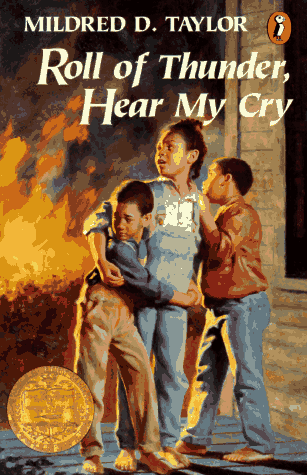
Roll of Thunder was technically released in the mid-70s, but the last post brought on numerous requests for its placement on the list so I decided to make a rare exception. The books examines the life and hardships of a black family struggling to hold on to their land against the tumultuous backdrop of 1930s Mississippi. Like many of these books, the themes are heavy--racism, prejudice, injustice--but the storytelling style brings it to a manageable level for young readers.
Shiloh
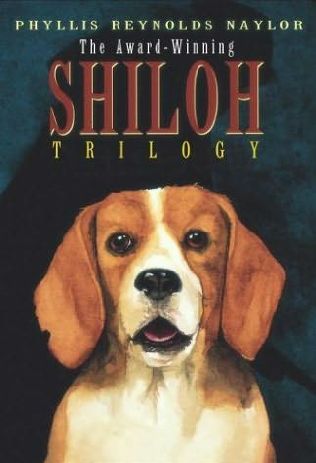
I love me some Phyllis Reynolds Naylor, so there's a special spot in my heart for the book that introduced me to her writing. Shiloh tells the story of a young boy who takes in a stray dog in hopes of protecting him from his abusive former owner. It's heartbreaking in a quiet, non-earth shattering way, and sometimes I still imagine my adopted shelter dog was once under the iron fist of the unsavory Judd Travers.
Ramona Quimby, Age 8
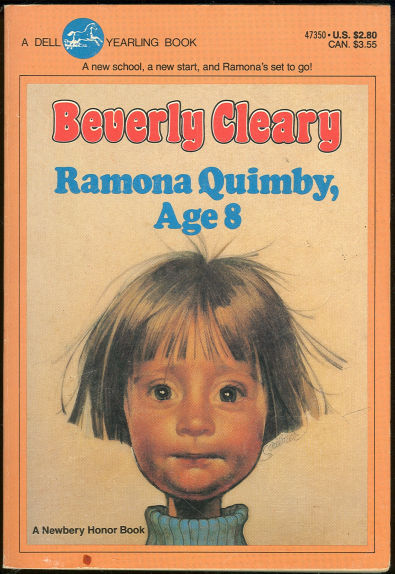
The sixth installment in the Ramona series is an ode to the minorly mischievous but ultimately sensitive child, starting with Ramona's unfortunate cafeteria egg incident and her subsequent overhearing of her teacher calling her a nuisance. The book continues in other delightful non-sequiturs; unlike many children's books that seem to be an adult's take on the way children think, Beverly Cleary manages to tap into that mysterious child psyche and give us a story that's simultaneously about nothing in particular and something important. Depending on the age of the reader, that is.
Jacob Have I Loved

Katherine Paterson's title references the biblical line, "Jacob have I loved, but Esau I have hated," regarding the story of Isaac's mismatched fraternal twin sons. Sarah Louise despises her position in the shadows of her prettier, better loved sister Caroline. The book is told from Sarah Louise's ("Weeze's") perspective, giving us insight into her jealousy and feelings of marginalization. The themes of sibling rivalry and intense envy can get a little depressing, but we've got some creepy romantic feelings between a 13-year old girl and 70-year old man to keep the pace exciting.
Island of the Blue Dolphins

This one is a bit of a cheat, too, as it was published in the 60s, but its popularity among young readers held steady throughout the ensuing decades. It's yet another tale of a child left to fend for himself, only in this case that "himself" is more of a "herself." The book is loosely based on the true story of Juana Maria, portrayed in Islands as Wonapalei, known secretly as Karana. After Karana's people are devastated by invading Aleuts, the tribe embarks on a ship for the mainland. Karana's brother is left behind, so her only logical solution is to jump ship and live with him on a secluded island. Did I say logical? I'm sorry, I meant book-worthy. Her brother dies nearly immediately, leaving Karana to take on packs of wild but eventually lovable dogs and to take hold of her own survival. I won't give away the entire book, but suffice it to say it's nice to see a female lead in these solo adventure stories every once in awhile.
The Sign of the Beaver

Elizabeth George Speare's The Sign of the Beaver is another classic example of cultural and historical lessons cleverly disguised as fun reading. Well done, Speare. Like Hatchet, Sign allows our imaginations to run wild at the prospect of a preteen left to fend for himself. In this case, however, Matt comes upon a Native American family and befriends the young son, Attean. Attean teaches Matt about the ways of Nature, Matt teaches Attean to read, and we all share a heartwarming story of prejudices overcome.
Roll of Thunder, Hear my Cry

Roll of Thunder was technically released in the mid-70s, but the last post brought on numerous requests for its placement on the list so I decided to make a rare exception. The books examines the life and hardships of a black family struggling to hold on to their land against the tumultuous backdrop of 1930s Mississippi. Like many of these books, the themes are heavy--racism, prejudice, injustice--but the storytelling style brings it to a manageable level for young readers.
Shiloh

I love me some Phyllis Reynolds Naylor, so there's a special spot in my heart for the book that introduced me to her writing. Shiloh tells the story of a young boy who takes in a stray dog in hopes of protecting him from his abusive former owner. It's heartbreaking in a quiet, non-earth shattering way, and sometimes I still imagine my adopted shelter dog was once under the iron fist of the unsavory Judd Travers.
Ramona Quimby, Age 8

The sixth installment in the Ramona series is an ode to the minorly mischievous but ultimately sensitive child, starting with Ramona's unfortunate cafeteria egg incident and her subsequent overhearing of her teacher calling her a nuisance. The book continues in other delightful non-sequiturs; unlike many children's books that seem to be an adult's take on the way children think, Beverly Cleary manages to tap into that mysterious child psyche and give us a story that's simultaneously about nothing in particular and something important. Depending on the age of the reader, that is.
Jacob Have I Loved

Katherine Paterson's title references the biblical line, "Jacob have I loved, but Esau I have hated," regarding the story of Isaac's mismatched fraternal twin sons. Sarah Louise despises her position in the shadows of her prettier, better loved sister Caroline. The book is told from Sarah Louise's ("Weeze's") perspective, giving us insight into her jealousy and feelings of marginalization. The themes of sibling rivalry and intense envy can get a little depressing, but we've got some creepy romantic feelings between a 13-year old girl and 70-year old man to keep the pace exciting.
Island of the Blue Dolphins

This one is a bit of a cheat, too, as it was published in the 60s, but its popularity among young readers held steady throughout the ensuing decades. It's yet another tale of a child left to fend for himself, only in this case that "himself" is more of a "herself." The book is loosely based on the true story of Juana Maria, portrayed in Islands as Wonapalei, known secretly as Karana. After Karana's people are devastated by invading Aleuts, the tribe embarks on a ship for the mainland. Karana's brother is left behind, so her only logical solution is to jump ship and live with him on a secluded island. Did I say logical? I'm sorry, I meant book-worthy. Her brother dies nearly immediately, leaving Karana to take on packs of wild but eventually lovable dogs and to take hold of her own survival. I won't give away the entire book, but suffice it to say it's nice to see a female lead in these solo adventure stories every once in awhile.




